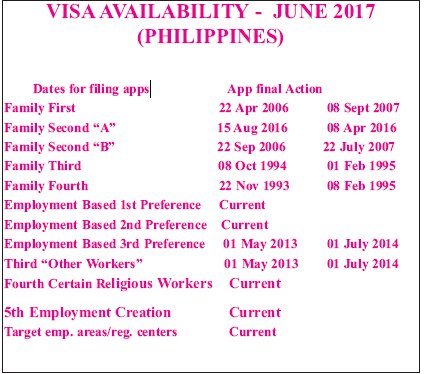
By: Robert Gard

The U nonimmigrant status (U visa) is set aside for victims of certain crimes who have suffered mental or physical abuse and are helpful to law enforcement or government officials in the investigation or prosecution of criminal activity. Congress created the U nonimmigrant visa with the passage of the Victims of Trafficking and Violence Protection Act (including the Battered Immigrant Women’s Protection Act) in October 2000.
The legislation was intended to strengthen the ability of law enforcement agencies to investigate and prosecute cases of domestic violence, sexual assault, trafficking of aliens and other crimes, while also protecting victims of crimes who have suffered substantial mental or physical abuse due to the crime and are willing to help law enforcement authorities in the investigation or prosecution of the criminal activity. The legislation also helps law enforcement agencies to better serve victims of crimes. There is an annual cap or quota on U visas of 10,000 per year (more on that later.) If you are the principal applicant, you can also file for your spouse and children, and parents and unmarried siblings as well, if the principal applicant is under 21. U visas, when granted, are generally valid for 4 years, and may be extended under certain limited circumstances.
A judge, police officer, prosecutor or other official must complete a “certification of helpfulness” (I-918 Supplement B, U Nonimmigrant Status Certification) on your behalf. This document is a vital part of your application. It certifies that you have been a victim of qualifying criminal activity, have information that will be useful to law enforcement, and are cooperating in order to bring the perpetrator to justice.
The agencies that will most commonly certify a U visa petition are local, state, and federal police departments and prosecutors. Even a judge (usually in the criminal or family law courts) may sign a U visa certification, although many will refuse to do so in order to avoid a showing of bias for the prosecution. However, any state or federal agency that has “responsibility for the investigation or prosecution of a qualifying crime or criminal activity” may complete the certification of helpfulness. For example, if you are the victim of a crime that requires the involvement of Child Protective Services (CPS), you could bypass the police and justice departments and instead have CPS help you with your application. USCIS states that people who are in a supervisory role and have responsibility for issuing certificates of helpfulness must sign the petition, but allows the agency to designate another certifying official if it chooses to do so.
You may be eligible for a U nonimmigrant visa if: You are the victim of qualifying criminal activity. You have suffered substantial physical or mental abuse as a result of having been a victim of criminal activity.
You have information about the criminal activity. If you are under the age of 16 or unable to provide information due to a disability, a parent, guardian, or next friend may possess the information about the crime on your behalf (see glossary for definition of ‘next friend’). You were helpful, are helpful, or are likely to be helpful to law enforcement in the investigation or prosecution of the crime. If you are under the age of 16 or unable to provide information due to a disability, a parent, guardian, or next friend may assist law enforcement on your behalf.
The crime occurred in the United States or violated U.S. laws. You are admissible to the United States. If you are not admissible, you may apply for a waiver on a Form I-192, Application for Advance Permission to Enter as a Nonimmigrant.
To apply (petition) for a U nonimmigrant status, submit: Form I-918, Petition for U Nonimmigrant Status Form I-918, Supplement B, U Nonimmigrant Status Certification. The Form I-918, Supplement B, must be signed by and authorized official of the certifying law enforcement agency (PDF) and the official must confirm that you were helpful, and currently being helpful, or will likely be helpful in the investigation or prosecution of the case. If any inadmissibility issues are present, you must file a Form I-192, Application for Advance Permission to Enter as Nonimmigrant, to request a waiver of the inadmissibility;
A personal statement describing the criminal activity of which you were a victim; and Evidence to establish each eligibility requirement
The limit on the number of U visas that may be granted to principal petitioners each year is 10,000. However, there is no cap for family members deriving status from the principal applicant, such as spouses, children, or other eligible family members.
If the cap is reached before all U nonimmigrant petitions have been adjudicated, USCIS will create a waiting list for any eligible principal or derivative petitioners that are awaiting a final decision and a U visa. Petitioners placed on the waiting list will be granted deferred action or parole and are eligible to apply for work authorization while waiting for additional U visas to become available.
Once additional visas become available, those petitioners on the waiting list will receive their visa in the order in which their petition was received. Petitioners on the waiting list do not have to take any additional steps to request the U visa. USCIS will notify the petitioner of the approval and the accompanying U visa.
Note to Petitioners: Principal U nonimmigrant petitioners are employment authorized incident to status, after the underlying petition for U nonimmigrant status is approved and an employment authorization document is automatically issued without filing Form I- 765, Application for Employment Authorization.
Derivative family members residing inside the United States are also employment authorized incident to status, however an employment authorization document is not automatically issued. Form I- 765, Application for Employment Authorization, may be filed for a derivative to obtain an employment authorization document.
Employment authorization for principals and derivatives can only be issued after the underlying U nonimmigrant status petition is approved, regardless of when the Form I-765, Application for Employment Authorization, is filed. Currently, we are seeing significant backlogs in approvals, just now receiving approvals on U visa applications filed in early to mid-2014.
If the statutory cap is reached in a fiscal year and USCIS uses the waiting list process described at 8 CFR 214.14(d)(2), petitioners for U nonimmigrant status and derivatives in the United States can apply for employment authorization using Form I-765, Application for Employment Authorization, based on deferred action. An application for employment authorization based on deferred action can only be approved after DHS has deferred action in your case, regardless of when the Form I-765 is filed.
You may be eligible to apply for a Green Card (adjustment of status/permanent residence) if you meet certain requirements, including:
You have been physically present in the United States for a continuous period of at least three years while in U nonimmigrant status, and You have not unreasonably refused to provide assistance to law enforcement since you received your U visa.
To apply for permanent residence (a Green Card) for yourself or a qualifying family member, visit our Green Card for a U Nonimmigrant page.
PLEASE NOTE: Any qualifying family member who does not have a derivative U visa when the principal U nonimmigrant receives a Green Card is no longer eligible for a derivative U visa, but may still be eligible to apply for lawful permanent residence. For information on extending your principal U visa to ensure your family member remains eligible for a U visa, please visit the T and U visa extension memorandum (PDF, 91 KB).
If the family member deriving status based on your status has met the eligibility requirements for a Green Card, they may apply for lawful permanent residence by filing their own Form I-485, Application to Register Permanent Residence or Adjust Status, and following the instructions on the Form I-485, Supplement E (PDF, 60 KB).
Even if your family members never had U nonimmigrant status or a U visa, they may still be eligible for a Green Card.
First, you must file a Form I-929, Petition for Qualifying Family Member of U-1 Nonimmigrant, for each eligible family member. You may file the Form I-929 at the same time or after you file your Form I-485.
If the Form I-929 for your family member(s) is approved:
Family members in the United States may file the Form I- 485 to apply for a Green Card. Family members outside the United States must first visit a U.S. embassy or consulate to obtain their immigrant visa. Information for the local U.S. embassy or consulate and the procedures for obtaining a visa to enter the United States may be found atwww.usembassy.gov. NOTE: The Form I-929 is the form that is used to establish whether your family member is eligible to apply for a Green Card based on your U visa based lawful permanent resident status. This does not mean that your family member will receive a Green Card. Even if the Form I-929 is approved, your family member is not automatically eligible for work authorization. They are eligible to work once they have received their Green Card.
QUICK NOTES:
The H-1B “cap subject” filing season for fiscal year 2018 (beginning on October 1, 2017) ended at the end of the first week of April. USCIS announced on April 7, 2017, that it has received enough H-1B petitions to reach the statutory cap of 65,000 visas for fiscal year (FY) 2018. USCIS has also received a sufficient number of H-1B petitions to meet the U.S. advanced degree exemption, also known as the master’s cap.
USCIS received 199,000 H-1B petitions during the filing period, which began April 3, including petitions filed for the advanced degree exemption. This represents a 15.7 percent decrease from the 236,000 petitions that USCIS received during last year’s filing period. In an atmosphere of uncertainty, it is not surprising that fewer petitions were filed this year, despite the evidence that H-1B visa holders are job creators that benefit our economy.
On April 11, USCIS used a computer-generated random selection process, or lottery, to select enough petitions to meet the 65,000 general-category cap and the 20,000 cap under the advanced degree exemption. USCIS will reject and return all unselected petitions with their filing fees, unless the petition is found to be a duplicate filing. The agency conducted the selection process for the advanced degree exemption first. All unselected advanced degree petitions then became part of the random selection process for the 65,000 cap.
Contrary to the rhetoric, U.S. businesses do not seek H-1B workers in order to save money; the reality is that the fees and costs associated with filing a successful petition are high enough that most employers use the H-1B because they cannot locate a qualified U.S. worker to fill the position. Though overall receipts are down less from last year’s receipts, this year is the fifth year in a row that enough petitions were filed to reach the cap within the first week of the filing period. Moreover, the H-1B cap has been reached prior to the end of the fiscal year every single year since 1997, except for a few years when the cap was temporarily raised to 195,000.
 VIA Times – May 2017 Issue Vital News, Vibrant VIews for Asian Americans in Chicago & Midwest
VIA Times – May 2017 Issue Vital News, Vibrant VIews for Asian Americans in Chicago & Midwest

